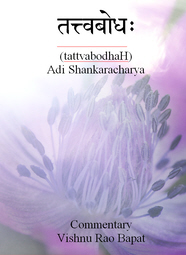Here begins the promised article on pratibandha-s. It is actually one of the topics in the book that I am currently writing called ‘Confusions… for the seeker in Advaita Vedanta’. The book will be in two volumes: Vol. 1 – Knowledge, Experience and Enlightenment; and Vol. 2 – The World of Ignorance.
The first volume is specifically about aspects relating to what enlightenment is, how it is achieved, and its results; e.g. (facetiously) whether you gain it by reading books, dropping out of society or going into a permanent trance. The second volume will deal with what is actually taught by Advaita regarding the world, creation etc. and the various miscellaneous topics encountered on the way, such as ‘grace’, ‘teaching through silence’ etc. It will also cover the massive topic of ‘Ignorance’, although logically this might have been included in Volume 1.
Accordingly, if you read the posts of this topic (there will be 6 parts), you will encounter references to other sections and to sources that will only be referenced in the Bibliography. Please ignore these (apart from deciding that you must buy the book when it appears – probably second half of 2021.)
This post on pratibandha-s will cover the following sub-topics. Accordingly, please do not post comments on an early post that are likely to be addressed in a later one. Ideally, wait until all parts are posted before commenting, although I realize that some may find this difficult. 😉
pratibandha-s – Part 1
- prArabdha – Part 2
- vAsanA-s
- nididhyAsana – Part 3
- viparIta bhAvanA
- avidyA lesha
- j~nAna phalam – Part 4
- vij~nAna – Part 5
- ‘Who am I?’ in communication
- ‘Who am I?’ in thinking
- The ‘mixture of Atman and mind’ – Part 6
- No one is ever liberated
- Post-Shankara contributions to the concept – Parts 7 to 10


